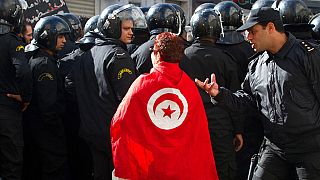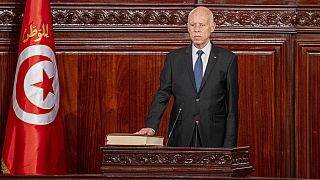Tunisia
President Kais Saied on Thursday accused unnamed politicians of using refuge overseas to "plot" against the state, implicitly targeting one of his predecessors based in France.
"Tunisia is a free and independent state and there can be no interference in its affairs," he said at the first meeting of a new cabinet following his July power grab.
"Some have used refuge abroad to attack Tunisian interests."
Without naming him, Saied referred to a speech by France-based former president Moncef Marzouki, who has called the president's moves a "coup d'etat".
Addressing anti-Saied demonstrators in Paris on Saturday, Marzouki -- Tunisian leader from 2011-2014 -- urged the French government to "reject any support for this regime and this man who has plotted against the revolution and abolished the constitution".
"Democratic France should not be on the side of the dictatorial regime," the former president said, in a speech that was filmed and widely shared online.
Saied on July 25 sacked the government, froze parliament and seized a range of powers, moving later to rule by presidential decree before last month naming geologist Najla Bouden as prime minister.
The president earlier this month named a government he will technically control.
Saied on Thursday accused "traitors that seek refuge overseas" of threatening Tunisia's sovereignty and urged the new Justice Minister Leila Jaffel to open an enquiry.
"He that did this will have his diplomatic passport revoked as he is the greatest enemy of Tunisia," he said.
"He cannot use this privilege to visit capitals and damage Tunisian interests."
Saied also met US Ambassador Donald Blome on Thursday, coinciding with a congressional meeting entitled "Tunisia: Examining the State of Democracy and Next Steps for US Policy".
The president "informed (Blome) of the State of Tunisia's annoyance at the situation in Tunisia being included in the proceedings of the American Congress", the presidency's Facebook page said.
Some of Saied's opponents have accused him of seeking a new dictatorship, a decade after Tunisia's 2011 revolt that overthrew dictator Zine El Abidine Ben Ali.
But the president's supporters say his moves were needed after years of deadlock among political parties seen as corrupt and self-serving.












01:00
Tunisia: French student detained for weeks, flies back home
01:10
Voters head to polls in Somaliland as leaders hope for global recognition
Go to video
Ugandans detained for insulting President Museveni and family on TikTok
00:57
Residents in Botswana await results of the country's general election, after polling stations close
Go to video
Nigeria's President reshuffles cabinet amid historic cost-of-living crisis
01:01
President Paul Biya returns to Cameroon, after 6-week long absence sparked health concerns